

Did you know? On average, casting directors get about 3,000 submissions per role. Out of those, they audition 30 people.
And out of those, they choose just one.
This means you only have a 1% chance of getting in the room every time you submit yourself.
This is why your three primary marketing materials – your headshot, reel, and resume – are so important! Today, we'll be going into depth on your acting resume.
Most actor resume templates require special software or are very complicated to use and edit. For that reason, we've put together 3 super simple Google Docs templates ANYONE can use (no matter what type of computer you have).
Here's what you get:
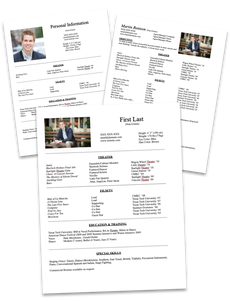
An actor resume is a quick, easy-to-look-at reference that tells casting directors your experience. It shows the most noteworthy roles you've played along with your training, special skills, and contact information.
An acting resume is broken up into four sections, which we'll be covering in depth in this article:
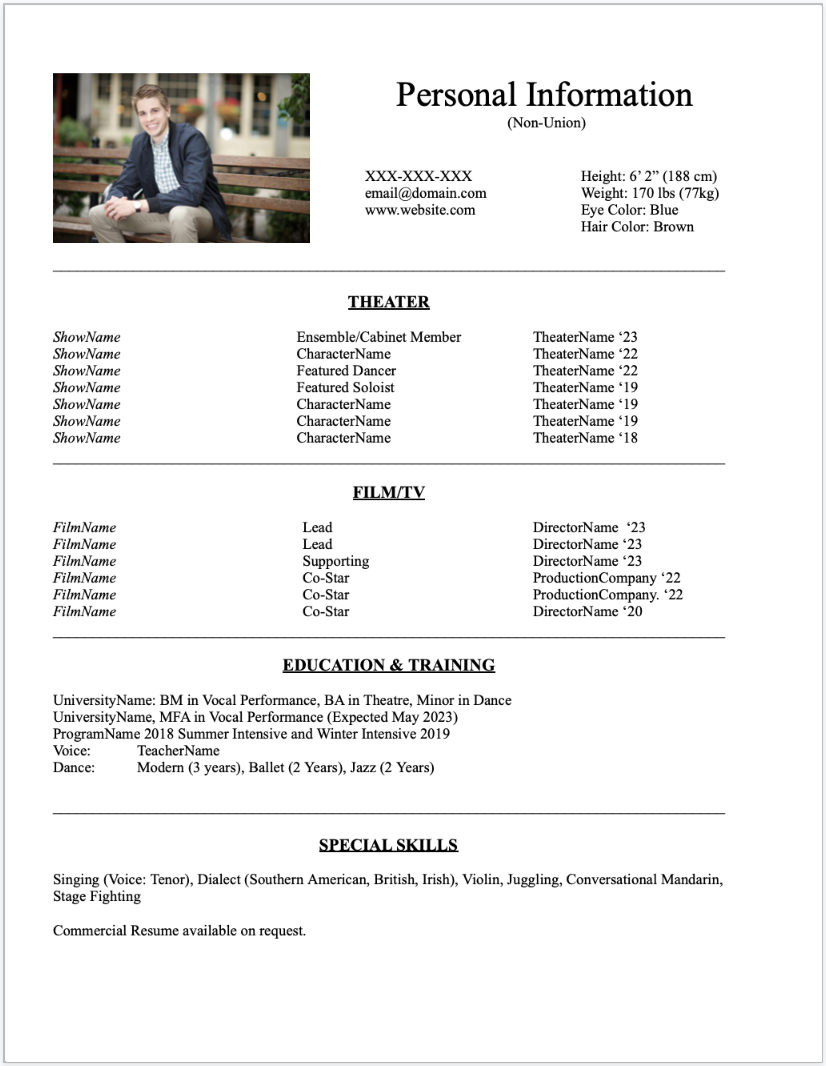
"How do I make an acting resume with no experience?" Well, don't worry just yet. There are plenty of ways to book roles with no experience, and believe it or not you can absolutely create an acting resume without any credits at all. We'll discuss that soon.
In this section, we'll cover everything needed for each section of your professional acting resume, starting from the top (Personal Information) and moving all the way down to the bottom (Special Skills).
Before you start, I recommend you download my free Google Docs resume templates so everything is in perfect alignment and formatted correctly. Then, follow along!

This is where you'll list the basics, such as your contact info and descriptive information about yourself. Use the following checklist and include everything you can (it's OK if you don't have everything listed below):
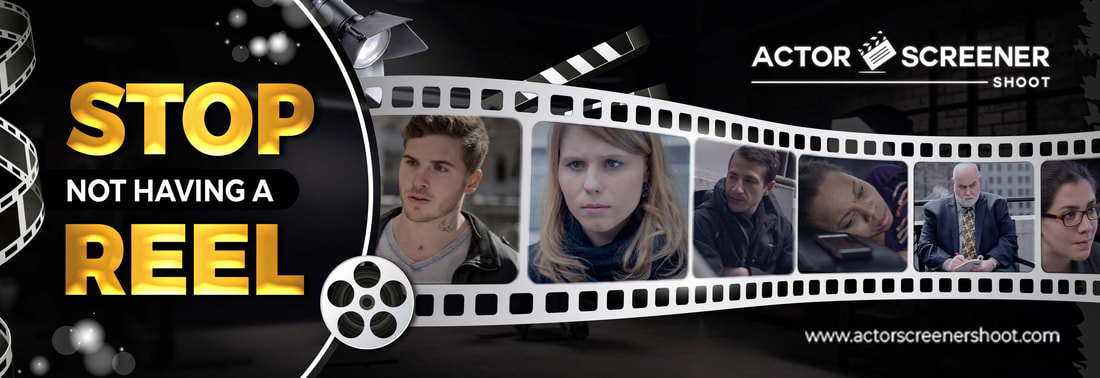
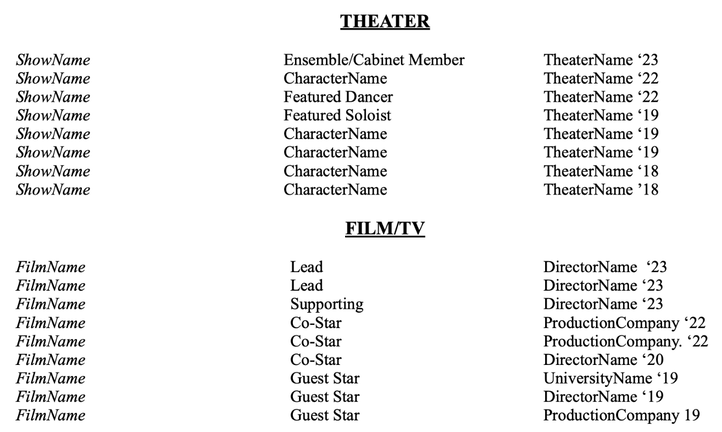
So how do you list roles on an acting resume? Well, the Credits section is where the bulk of your resume content will be, unless of course you're just starting out (in which case the bulk of your resume will be under Training & Education).
Follow the below guidelines to ensure your resume looks professional:
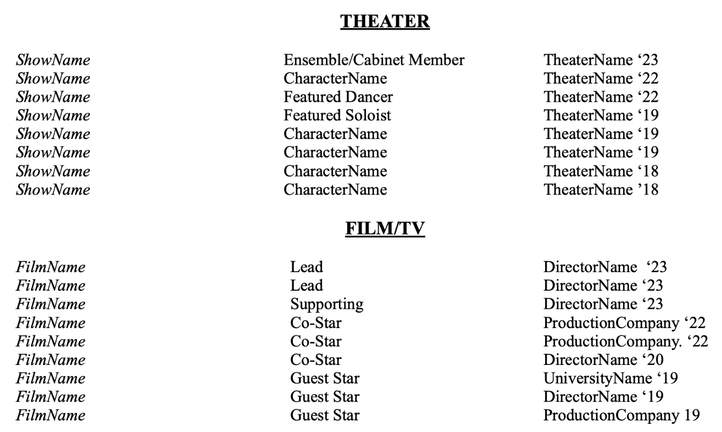

In this section, you'll list out formal training (if related to acting), acting workshops, seminars, studio classes, master classes, or private coaching. This also includes special training not directly related to acting, such as singing or stunt-work.
Using a two-column format like below can make it easy for them to read. Including dates is optional but recommended if you completed the training within the past 2-3 years.

If you need to fill up a lot of space, feel free to list bullet points under each training, showing specifically what knowledge was gained. Example:
Not only do special skills help you book more roles because they're unique and less people have them, but they also use up some of that dreaded white space on your resume.

"So what skills should I put on my acting resume?" Here are some examples:
Put whatever you think is most noteworthy first so casting directors notice it. And don't say you can do something if you're not actually proficient at it!
Most of the actor resume templates found online either require special software or are very complicated to use and edit. For that reason, we've put together 3 super simple Google Docs templates ANYONE can use (no matter what type of computer you have).
Here's what you get:
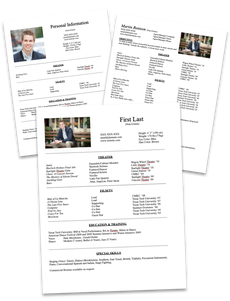
As Einstein says, "Insanity is doing the same thing over and over and expecting different results."
I'm all about thinking differently, and I teach actors how to break the rules and do things most other actors don't consider.
In fact, one of my clients landed his first-ever Broadway role in just 4 weeks of implementing some of my "outside the industry" strategies.
So now that you understand the basics of a professional acting resume, I'd like to present you with three "outside the industry" hacks you can use to make your resume even MORE effective:
A unique way to stand out from other actors (and use up some dreaded "white space") is to include noteworthy reviews or quotes from people you've worked with in the industry. You can list 2-3 simple one-sentence reviews at the very bottom of your resume (center-aligned), such as "John Doe was one of the most consistently on-time and professional actors I've ever had the pleasure of working with. – Jane Smith (Director, Bluefin Dolphins)"
Don't have any quotes? Just email some past teachers or friends you've worked with and ask them to write 1-2 sentences. Obviously, the bigger their names the better, but even if they're unknown people, you can still include their quotes on your resume just to provide some "social proof" so to speak.
You should also include any awards you've won in parentheses next to the role you played. Keep in mind that these awards should actually be noteworthy and professional – don't mention the high school "Funniest Actor" award you won for the little video you made with your friends.
A resume objective tells casting directors what your goals are. or if you do it right, why they should hire YOU over other actors for this specific project.
Here's an example of a weak resume objective: To become a successful, world-renowned actor who is reputed for her craft and compelling performances on stage and film.
This is OK, but is focused on YOU, instead of the production. Casting directors don't care about you, they only care about what you can do to help them.
Instead, do a bit of googling on the production and then tailor your objective to the type of project you're submitting to. If you're submitting to a slapstick comedy TV show, for instance, chances are the production wants an actor who can make the audience laugh. So you can customize your resume objective like so:
Strong objective for a comedy film submission: To bring smiles and laughter to the faces of as many people in the world as possible through my acting.
Do you think the casting director will notice? You bet they will!
If you're submitting to a dramatic indie film, think about the purpose of the film. is it trying to share an important message with the world? Is it trying to make a political statement? Make an educated guess about the purpose of the project and then tailor your resume objective to that.
Since it's right at the top of your resume, the casting directors will notice and be more likely to bring you in for an audition!
There are three ways you can customize your resume so a casting director feels more compelled to bring you in. Here they are:
Knowing how to create a great acting resume is important, but it's just one small part of growing your acting career.
If you want to act full-time, your first major goal should be to get a legitimate, hardworking talent agent.
I highly recommend checking out this short podcast episode, where I share: